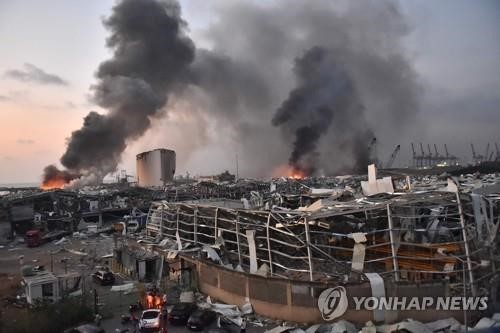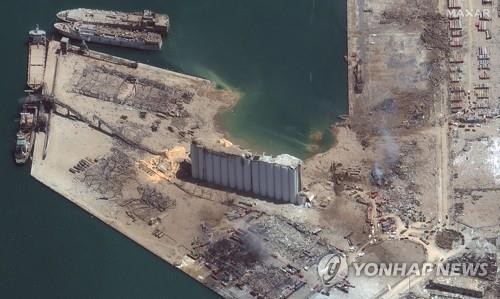An atomic like cloud was visible in the sky over the capital city Beirut in Lebanon as an explosion levelled the port and much of the surrounding area on August 4, 2020. The cause of the blast was the improper storage of 2,750 tons of ammonium nitrate in warehouses in the area. When the dust settled, the blast left a huge crater, 124 meters in diameter, 171 people killed and more than 6000 injured and an entire country in mourning. The damage was estimated to be more than $15 billion US. The country lost 85 percent of its stored grain and resulted in the government appealing to the world for emergency assistance as their supply of wheat would run out within 6 weeks. Most of the population was already living in poverty because of the nation’s a long-term economic recession and staggering unemployment rates that were in place even before the country was hit with COVID-19. However, this more recent incident is expected to intensify the recession.
 |
| ▲ The huge explosion caused widespread destruction in Beirut. (Photo from Yonhap News) |
According to a local source, a spark from nearby welding operation during a warehouse renovation triggered the fire, when it lit the ammonium nitrate that had been stored in the port for six years. Ammonium nitrate, is a highly flammable substance, used as a fertilizer for agriculture and as a volatile compound for making weapons like bombs and gun powder. The explosion destroyed more than 8,000 buildings and damaged architectural heritage sites. UNESCO identified around 640 damaged historical structures and found 10 percent of them were expected to collapse. Many Lebanese people lost their homes.
An aide to the Lebanese prime minister said that workers were unaware of the ammonium nitrate stored in the port and were not properly supervised. The Lebanese Minister of Information, Manal Abdel Samad decided all officers involved in managing the storage of the ammonium nitrate would be placed under house arrest. However, customs officers opposed the actions claiming that the man-made disaster was a result of years of ignoring warnings they sent to authorities that went unanswered. Officials were made aware of the dangers in place in letters sent more than six times since 2014. This led the Lebanese people to conclude the disaster could have been avoided if the government had taken action to ensure the safe storage of the deadly material. Anti-government protesters gathered to outside parliament to voice their dissatisfaction with their elected officials.
Lebanon imports nearly 85 percent of its food, and the port of Beirut, the epicenter of the explosion, plays a central role in that supply chain. With the port now severely damaged, food prices are likely to go beyond the reach of many ordinary citizens. The international community is engaged in efforts to help the struggling nation cope with their devastating situation. French President Emmanuel Macron announced that France will help organize a conference with European, American, the Middle Eastern, and other donors to raise money for food, medicine, housing and other urgent aid. The United Nations’ World Food Program provided supplies to displaced or homeless people after the blast. South Korea announced it would extend a 1 million US dollar emergency aid package to Lebanon. Moreover, South Korea’s military unit based in Lebanon provided emergency relief items to the country immediately following the deadly blast.
According to the Domestic Chemical Safety Agency in Korea, our nation handles 2.23 million tons of nitrate per year, with 121 domestic companies using the substance. The Yeosu National Industrial Complex produces 13 tons of ammonium nitrate per year, so caution is needed. When handling ammonium nitrate in Korea, companies must first get permission from the Ministry of Environment because this substance is listed under the Chemical Products Control Act. If the company is intending on handling more than 500 tons of the substance, they must submit safety reports to the handling agency. Despite the measures in place, Korea still has problems dealing with the management of chemical products. Most industrial complexes are situated near housing communities, putting citizens at risk to the same degree we saw in Lebanon. Furthermore, there are many management departments that deal with different parts of the handling laws, so if an accident occurs, there is no control tower to address the matter. This is a serious problem because an unclear chain of command makes it difficult to address any disasters and also compensate the victims. Improved pre-emptive safety regulations and post-accident countermeasures are necessary for the handling of dangerous chemicals in our country. This includes the establishment of an emergency disaster task force team charged with the control of hazardous chemical products and the response to any disasters that may occur.
 |
| ▲ A satellite picture of the ruined Beirut port (Photo from Yonhap News) |
정예지, 박유정, 박소현 dankookherald@gmail.com

![[Campus Magnifier] Let's Surf the Library!](/news/photo/202404/12496_1765_4143.jpg) [Campus Magnifier] Let's Surf the Library!
[Campus Magnifier] Let's Surf the Library!
![[Campus Magnifier] Let's Surf the Library!](/news/thumbnail/202404/12496_1765_4143_v150.jpg)





